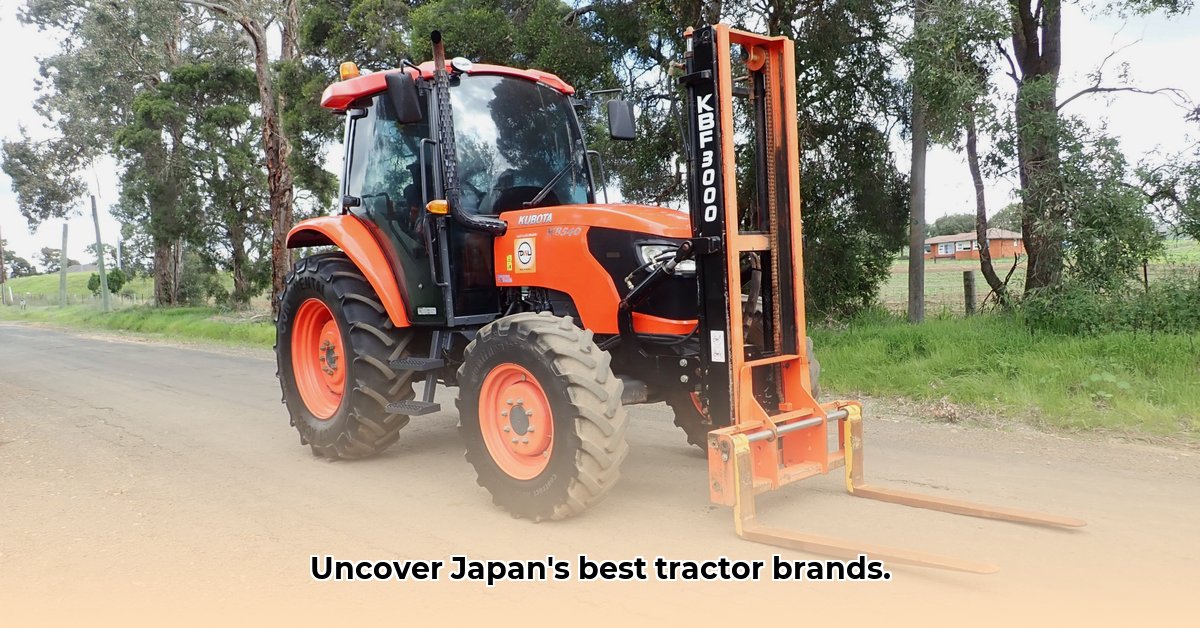
A Rich History of Innovation: From Rice Paddies to Global Fields
Japan's journey in tractor manufacturing is a compelling tale of ingenuity and adaptation. Initially focusing on smaller, maneuverable tractors suited to the country's unique topography – rice paddies and terraced hillsides – Japanese manufacturers quickly rose to global prominence. The mid-20th-century adoption of diesel engines proved pivotal, significantly boosting power and efficiency. This technological leap propelled Japanese brands onto the world stage, transforming them from regional players into global giants. Companies like Kubota, Yanmar, and Iseki didn't just build tractors; they pioneered advancements like sophisticated hydraulics and advanced fuel injection systems, shaping the future of agriculture. Did you know that many of the technologies we take for granted today originated from these Japanese innovations? For more on specific models, see this Minneapolis-Moline resource.
Key Players and Their Amazing Machines: A Closer Look
Several Japanese brands dominate the global agricultural machinery market. Let's examine some key players:
Kubota: Renowned for reliability, Kubota offers a comprehensive range, from compact tractors ideal for smaller farms to heavy-duty models for large-scale operations. Their commitment to integrating cutting-edge technology, particularly in fuel efficiency and sophisticated features, sets them apart. Kubota isn't just building tractors; they’re engineering sustainable farming solutions.
Yanmar: A major force known for its compact and highly efficient tractors, Yanmar's engines are legendary, powering not only their own machines but also a significant portion of tractors worldwide. Their unwavering focus on efficiency—in fuel economy and environmentally friendly design—is a cornerstone of their success.
Iseki: Iseki stands out for its specialized tractors, catering to specific agricultural tasks and niche requirements. Their tractors are recognized for robust build quality and precise engineering, making them a preferred choice among farmers demanding reliability and performance.
(High-quality images of Kubota, Yanmar, and Iseki tractors would be strategically placed here)
Mergers, Acquisitions, and a Globally Connected Industry
Strategic mergers and acquisitions have significantly shaped the Japanese tractor manufacturing landscape, boosting the global reach of these companies. These brands aren't merely exporting tractors; they're adapting their designs and technologies to meet diverse global needs. Their substantial market share is a testament to their adaptability and commitment to quality.
Sustainability: More Than a Buzzword – It's a Commitment
Modern Japanese tractor manufacturers are at the forefront of sustainable agricultural practices. This is not just marketing; it's a core value. Key advancements include improved fuel efficiency and reduced emissions. The integration of precision agriculture technologies optimizes resource utilization, leading to less fuel, water, fertilizer, and pesticide consumption. This translates to a reduced environmental footprint and increased profitability for farmers – a win-win.
The Future of Japanese Tractor Manufacturing: Challenges and Opportunities
What lies ahead for Japanese tractor brands? The future presents both challenges and exciting opportunities. While increased global competition remains a factor, continuous innovation will be essential to maintaining leadership positions. However, their history of adaptability and quality positions them favorably for continued growth. They're not simply building tractors; they're engineering a more sustainable and efficient future for global agriculture.
Actionable Insights for Stakeholders
This article provides a general overview. Further research is crucial before making major purchasing decisions. Always stay abreast of industry updates and advancements.
Key Takeaways:
- Japanese tractor brands lead in agricultural machinery innovation.
- Fuel efficiency is paramount for sustainable farming.
- Thorough research is vital before tractor purchasing.
- Consider long-term maintenance and parts availability.
Actionable Steps:
- Assess Your Needs: Determine your farm size, crops, and budget.
- Compare Fuel Efficiency: Obtain detailed fuel consumption data from multiple sources.
- Evaluate Maintenance: Research parts availability and maintenance ease for different models.
- Explore Advanced Features: Consider the benefits and costs of GPS guidance, automation, and precision farming tools.
- Secure Financing: Investigate financing options and potential government subsidies for sustainable equipment.
This article offers a general overview. Consult industry experts and conduct further research before making any critical decisions. The agricultural technology sector is constantly evolving; always seek the most current information.